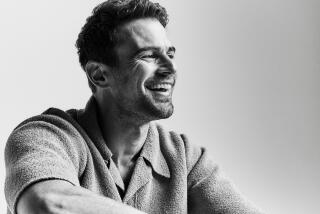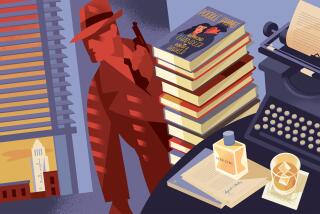A return to formula
LONDON — Like many English pubs, the Punch Bowl carries quite a history. The Mayfair drinking establishment first started serving ale in the middle of the 18th century, when King George II ruled. Like some pockets of London, though, the two-story tavern turned into a grimy relic of a forgotten era -- the janitor did the pub’s cooking and the beer was as uninspiring as the ambience.
And then filmmaker Guy Ritchie bought the place.
The pub’s scary meat pies have since been pushed aside by organic smoked salmon, and authentic, hand-pulled British pints have replaced the modern, soulless lagers.
“I love pubs, I love pubs,” Ritchie said during a recent visit to his bar as the refurbishment of the Punch Bowl was just beginning. “Pubs just happen to be one of those institutions that are just quintessentially English, and four pubs a day shut down in the U.K.”
The Punch Bowl isn’t Ritchie’s only restoration project.
The 39-year-old writer and director also is trying to breathe life into his own filmmaking career. After a commercial and critical slump that included “Revolver” and the remake “Swept Away” (which starred his wife, Madonna), Ritchie, with his new movie, “RocknRolla,” is returning to the genre that established his cinematic identity: the British gangster movie.
In 1998, Ritchie and producing partner Matthew Vaughn made “Lock, Stock and Two Smoking Barrels,” a low-budget London crime caper that overflowed with kinetic visuals, colorful dialogue and distinctive heavies. The drama grossed more than $100 million worldwide, and two years later Ritchie and Vaughn collaborated on “Snatch,” which helped to further Ritchie’s subspecies of stylishly violent British crime stories; similar efforts included Vaughn’s “Layer Cake” and Paul McGuigan’s “Gangster No. 1.”
But while Ritchie’s honor-among-thieves movies always had exhibited a complex mix of attitude, nihilism and convoluted plotting, the combination proved caustic to 2005’s “Revolver,” which was drubbed by critics and ignored by moviegoers. Even “300’s” Gerard Butler, who stars in “RocknRolla,” admits he didn’t see it.
“I think it’s impossible for a movie like that to do well. It’s an inaccessible concept,” Ritchie said in a postmortem of his movie about revenge, self-doubt and philosophy, “because it’s about the idea that there is essentially no such thing as an external enemy, that ultimately you are the enemy.”
What Ritchie needed, in other words, was a more clear-cut story of good versus evil. He began developing a remake of “The Dirty Dozen” with “Matrix” producer Joel Silver, and while that movie was grinding along in development, Ritchie decided he needed to get behind the cameras -- and soon.
So he sent his “RocknRolla” script to Silver and producing partner Susan Downey, whose new Dark Castle deal allows them to make movies other than horror films (which have included “House of Wax” and “Gothika”) for Warner Bros.
“It brings to mind the other movies,” Downey said of “RocknRolla,” “but it also advances them. It’s a return to form and an advancement of form.” Downey and Silver will produce Ritchie’s first American studio film, next year’s “Sherlock Holmes,” which stars Downey’s husband, Robert Downey Jr.
Butler believes that with “RocknRolla,” which opens Oct. 8, Ritchie has successfully returned to where he excelled. “I don’t think anybody believes we can do ‘300’ business on this,” he said, “but I think we have a great film on our hands.”
Like Ritchie’s best work, “RocknRolla” is filled with memorably duplicitous characters: a deceitful accountant (Thandie Newton), an equal-opportunity thug (Butler), a strung-out but savvy rock star (Toby Kebbell), a double-dealing crime boss Lenny Cole (Tom Wilkinson) and his not altogether loyal aide-de-camp, Archie (Mark Strong).
The setting is low-rent thuggery (although the film is largely free of Ritchie’s sometimes explicit violence), but the impetus is immigration and London’s rapidly evolving cultural and financial mix. Billionaire Russians are behind a suspicious land deal, and Lenny believes he can line his own pockets along the way.
Lenny also thinks he can still run the town, but the Russians have more pull. “There’s something wrong with these immigrants,” Lenny says at one point. “I don’t trust them.” Coming from a backstabber like Lenny, it’s almost high praise.
“It’s the natural changing of the guard. He’s just simply being eclipsed by bigger guns. He’s desperately trying to retain his position,” said Ritchie, who has also been working on a documentary about what he calls “the esoteric aspects of religion.”
Russians and real estate are very much the news in London; oligarchs from the former Soviet Union have been buying half of all local mansions valued at more than $30 million. The city’s skyline is dotted with construction cranes, and London will host the next summer Olympics, in 2012.
“I think there’s more building taking place in the last five years than took place within the 300 years or something previously,” Ritchie said. “It’s gone mad, and the labor force is mostly foreign. The place is alive.”
--
More to Read
Only good movies
Get the Indie Focus newsletter, Mark Olsen's weekly guide to the world of cinema.
You may occasionally receive promotional content from the Los Angeles Times.











